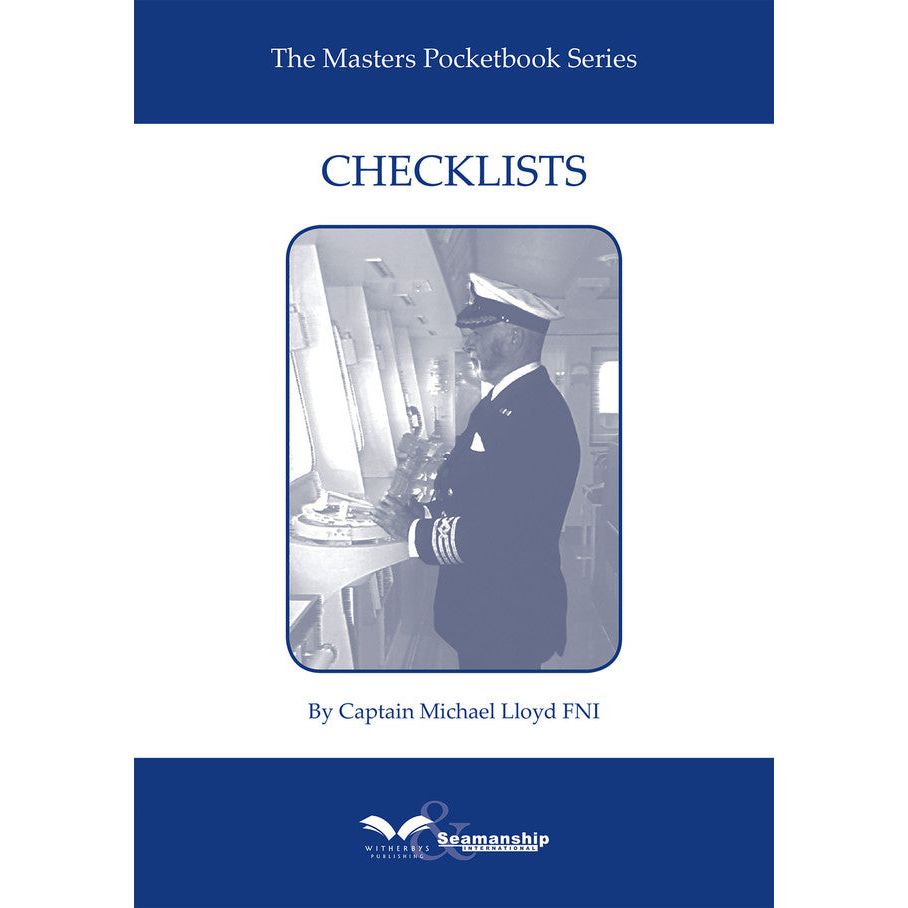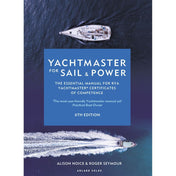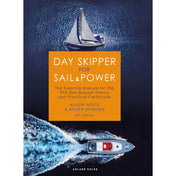Checklists - The Masters Pocketbook Series
| Author: | Michael Lloyd |
|---|---|
| Edition: | 2009 |
| Format: | Paperback |
| Size: | 180 x 120 mm |
Checklists - The Masters Pocketbook Series is backordered and will ship as soon as it is back in stock.
Couldn't load pickup availability
Delivery Information
Delivery Information
We aim to dispatch all orders by the next business day, but we're a small business and sometimes when it's busy it may take a little bit longer. If there's going to be any delays we'll get in touch and keep you up-to-date.
Shipping is free for all orders of £50 or more!
We work with Royal Mail, DPD and DHL to offer the most convenient delivery options to our customers.
Friendly Advice
Friendly Advice
Chris is a Master Mariner and knows a thing or two about seafaring. If you need any help then don't be shy - send us an email or get in touch using the WhatsApp icon.
Easy Returns
Easy Returns
Not what you were looking for? No problem. We can accept returns of items in as-sold condition for up to 30 days (maybe a bit longer but don't tell anyone).
Just let us know and we'll sort everything out, including the shipping cost back to us.
Unfortunately this doesn't apply to Print on Demand charts as they are correct at the time of printing.
Of course if there's any faults or damage then let us know and we'll make it right!
Structured Checklists for Shipboard Routines and Handover
Checklists – The Masters Pocketbook Series is a practical guide for Masters and officers to help establish a routine of order and responsibility for the main onboard management systems, including safety, communications, discipline and navigation. These checklists outline basic procedures for all ranks to ensure that critical checks and procedures are addressed and are not overlooked as new procedures are added or as crews change over. The checklists are designed to foster good communication between members of the crew and will aid the Master in delegating tasks to individuals.
The checklists can be adapted to suit whatever circumstances and personnel exist on board, ensuring maximum efficiency, safety and a continuation of command during handover. They cover topics such as:
- Safety
- Pollution prevention
- Ballast water management
- Preparation for port arrival
- Emergencies on board
Author’s Introduction
A ship, because of the environment in which it operates, has to be well ordered. This means that set routines have to be established for the various functions and procedures to ensure maximum efficiency and the safety of all onboard. With the general system of relieving, most commercial ships exist in a state of constant change of the officers responsible for its management. An established routine of order and responsibility ensures a smooth transition and a continuation of the management while the new officer settles into the ship and his position. Changes can then be made within the established procedure and with the acceptance of all others who may be affected by them.
Under the International Safety Management (ISM) Code, a vessel must operate within the framework and requirements of the Safety Management System (SMS). It is not intended to replace any system but to provide further support, reference and thought for those who wish to improve their systems onboard.
Another reason is it avoids conflict in areas where responsibilities overlap, or where there are ‘dead’ zones, with each officer thinking that the other is dealing with a certain problem when, in actual fact, no one is taking responsibility.
While not intended to conflict with laid down company procedures, which are often written as general regulations for all ships in their fleet, such a local management system enables adaptation to the circumstances onboard that particular ship, at that time.
Finally, it allows the command to change without disruption and provides the new Master a picture of how the ship management is presently functioning. This makes it easier for him to work within that organisation and to change whatever parts of the management he wishes should he choose to do so.
This book contains shipboard management procedures for all of the main management functions. These procedures are written and allocated to responsible officers purely as an indication of how responsibility can be allotted. They can be adapted to whatever circumstances and personnel exist onboard.
Ship and engine maintenance have been excluded as they fall within the province of these departments and each department should have its own management functions.
It is impossible to cover all functions or to have a procedure for all eventualities, especially in such a complicated environment as a ship, but by using these procedures and common sense, the ship and those on it will benefit from an organised system.
Why am I using checklists? Well, ‘senior moments’ do not only occur with seniors, they happen to us all regardless of age. That cold feeling you get when going to your cabin after clearing the port and you suddenly realise that the agent did not return the ship’s trading documents, or when you go to the cabin and see all the crew and official mail still waiting for posting and the ship is off for a forty day haul will make you realise the usefulness of lists.
Finally, I must offer thanks to Ronald Wöhrn, a Master Mariner and a Lawyer at Ahlers & Vogel, who authored the ‘Guidance to Masters’ manual and kindly allowed access to his publication for the benefit of this title on ‘Masters Checklists’.
Table of Contents
- Author’s Introduction
- Safety items
- Pollution
- Medical
- Navigation
- Cargo
- Meetings
- Communications
- Accommodation
- Personnel
- Discipline
- ISM and ISPS Codes
- Steering gear and engine tests
- Ballast water management
- Standing orders
- Preparation for port arrival
- Insurance and P&I Clubs
- Non-standard items
- Handover – arrival/leaving
- Emergency checklists
- Index
-
AuthorMichael Lloyd
-
Edition
-
Format
-
Size
-
Pages
-
ISBN
Payment & Security
Payment methods
Your payment information is processed securely. We do not store credit card details nor do we have access to your credit card information.








